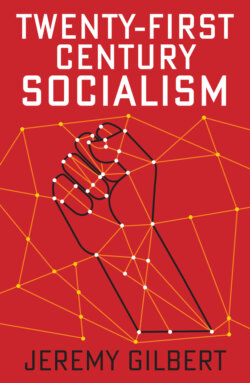Читать книгу Twenty-First Century Socialism - Jeremy Gilbert - Страница 6
Acknowledgements
ОглавлениеThis book wasn’t one that I ever expected to write, although I’m glad I have, and it’s only thanks to the persistence and patience of my colleagues at Polity – George Owers and Julia Davies – that it’s come about at all. Keir Milburn and Alex Williams both read and commented on a first draft and were insightful and supportive as ever.
The phrase ‘twenty-first-century socialism’ obviously isn’t one that I coined: it was being used in various publications from the late 1990s onwards, and probably much earlier. I used this phrase polemically once or twice before, but the first time I used it as the title for anything, it was at the behest of Craig Gent, who asked me to write a short piece on the topic for Novara Media that in some ways ended up becoming the intellectual kernel of this book. In broader terms, the present volume draws on arguments that I’ve made in earlier, more academic work, such as my books Anticapitalism and Culture and, most importantly, Common Ground. Perhaps more immediately, it draws on commentary that I’ve written for publications such as Soundings, the Guardian, Red Pepper and New Statesman over many years – but above all for Open Democracy. Perhaps most directly it draws on the pamphlet ‘Reclaim Modernity’, which I wrote with Mark Fisher and which was published by the think tank and lobby group Compass in 2014. I’m grateful to all these outlets and to my editors, readers and collaborators there.
More than any of those sources, however, some of the book’s key sections on the nature of capitalism and socialism and on the defining features of recent and contemporary history draw on my many years of teaching undergraduates at the University of East London. Teaching students on degree programmes in cultural studies, sociology, music, media studies, politics, history and English – trying to equip with them with a comprehensive and comprehensible account of how the world works and how it got that way – has often been a challenge, but always a rewarding one. It’s a matter of great regret that most of those degree programmes no longer exist, but the many students who passed through them are all owed a debt of gratitude for helping me to shape and hone much of the account and analysis offered here. So are my colleagues at the Centre for Cultural Studies Research at UEL, which thankfully persists in its commitment to public discussion, freed education and political analysis as well as to exploring the boundaries of cultural studies and cultural theory.
Above all, of course, like most writers, I owe a permanent debt of gratitude to my immediate friends and family for their ongoing support and inspiration. Jo Littler and our children – Robin and Isla – make every day special and make the future matter more than ever. It would really be impossible to list all the friends and colleagues who contribute to and stimulate my political thinking every day, but over the past few years friends connected to and taking part in the Culture, Power, Politics seminar series, as well as organisations and projects such as Compass, Momentum, The World Transformed, the New Economy Organisers Network and #ACFM have all been crucial sources of insight and interlocution. Many thanks to all of them.
